6 Reasons Burton's Willy Wonka Is Actually A Serial Killer

You might want to sit down for a second, because the information I'm about to give you will knock you straight on your ass: Tim Burton is kind of a weirdo.
He is, after all, the man who kidnapped Santa and had one of his protagonists marry a corpse, and whose own wife (who is also a corpse) lives in a separate house with a lockable door between them. But it was when he adapted Charlie And The Chocolate Factory for the big screen that it became apparent that he is deeply unhinged, taking a much-loved children's book and turning it into a slasher flick. No, seriously ...
It All Starts With Willy Wonka's Descent Into Madness

Like any good slasher flick, in order to understand the killer's murderous tendencies, we have to start with his origins. And just like Freddy and Jason (linked above), Tim Burton's version of Willy Wonka has that dark backstory: He was abused.
Unique to Burton's version, Wonka has a malevolent father (Dentist Saruman!), who denies him candy of any sort and makes him wear disfiguring and alienating braces. He even burns his son's Halloween candy, then makes him throw out the remains. That doesn't sound like much, but consider this: His having Halloween candy in the first place implies that he let Wonka go trick-or-treating, purposely dangling childhood's biggest reward in front of his face, only to spitefully destroy it right in front of him after he's put in all the work to obtain it. After he's built up a massive amount of hope and expectation. For a child, it's mental torture.
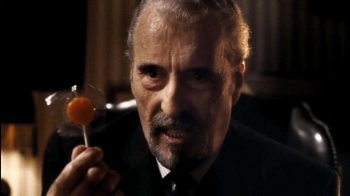
He then made several crude suggestions as to where the final lollipop could be shoved.
Doesn't sound like abuse to you? Wait, it gets worse.
When Willy asks him if he can have one just to try it, his father tells him that he has a chocolate allergy, messing with his head and telling him he will be itchy all over if he eats a single one. On the surface, he's bald-faced lying to his child. But from a deeper, psychological standpoint, he's saying, "It's your fault that you can't have what other kids have." Then we see a pure example of neglectful and abusive parenting when Willy finally has enough and says he will run away to Switzerland to make chocolate. His father's response? "I won't be here when you come back."
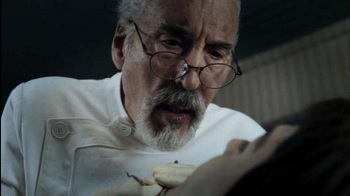
Then he started asking Willy if it was safe.
This is only a brief glimpse into Wonka's childhood, but we get a pretty clear picture that it isn't a one-time incident. It's just one scene in a long line of neglect and outright emotional abuse. It's likely that this is only the tip of the iceberg with a cold, unfeeling, manipulative monster of a father. It paints a picture of an extremely strict perfectionist who denies his son not just the basics of childhood but even the most remedial emotional connection. This not only motivates Willy Wonka to become the world's best chocolatier, it also turns him into a psychopathic killing machine with an innate distrust of adults and a burning need for revenge.
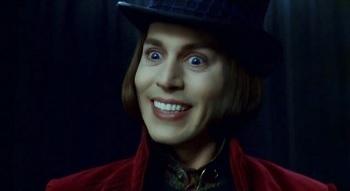
But who could have seen all that coming just from looking at him?
In a scene that could be in any slasher, the young, disfigured (and homeless) Willy Wonka stands in the middle of a lightning storm, looking at the vacant lot where his factory will one day stand, and begins to plot.
Years of jealousy and resentment eventually turn him into a child-killing machine who takes revenge on all the kids who have what he didn't. Namely, parents who will accompany them to a chocolate factory and who spoil them with candy. And, more specifically, the ones who don't appreciate it and take it for granted.
Willy Wonka's Illness Forces His Hand

Willy Wonka has been the world's greatest chocolatier for 15 years by the time the competition starts. No one knows what the secret prize one lucky kid will get is, but we learn that Wonka is looking for someone to replace him as head of the factory. But why now? He can't be older than 30ish at this point, right?
In a flashback, Wonka says that he discovered his first gray hair and started to think of the future. OK ... but what's all the rush? There are decades between getting your first gray hair and shuffling off this mortal coil. Willy Wonka should have many years ahead of him, continuing to make great chocolate and take his time to seek out a suitable heir.
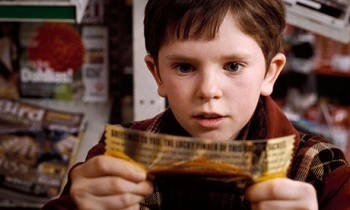
An heir he's jump-starting on the track to juvenile diabetes, but still.
But that's not the case: Wonka is in a rush to find a replacement because he thinks he's dying. Rapidly. And it has nothing to do with a gray hair ... he has a disease. A very specific one, too.
At no point during Burton's film do we see a single fruit or vegetable. As a result of his father's cruelty, Willy Wonka's interest in candy became an obsession: He went from never having candy to the point where he ate it for every meal. Wonka retreated into his factory, his own hermetically sealed world with everything he could possibly need (apart from vitamins or minerals), not knowing the horrible health issues it would create.

This isn't part of his factory; it's part of his kitchen.
A lifetime's diet based on candy will seriously damage your health. Eating excessive amounts of sugar has been linked to many terrifying diseases and disorders, including the wonderfully efficient fungus called candida.
Willy Wonka's dress sense and mannerisms are bizarre to say the least, but it all makes sense when you consider that he is seriously ill and doesn't want anyone to know it. Especially when you know the symptoms of a severe case:
Candida's symptoms include skin and nail fungal infections, which he hides with his ubiquitous purple leather gloves. Hives and rashes, which account for the wig. Chronic fatigue, which explains the cane. Poor memory, lack of focus, and brain fog, which are so obvious even Mr. Teavee (a geography teacher, not a doctor) asks him, "Do these flashbacks happen often?" He repeats himself without knowing he is doing it. Irritability, mood swings, anxiety, and depression, which are present throughout the film when he snaps at the children for no reason or starts to reminisce about his past. Strong sugar cravings, which is clearly the case and only compounds his illness, as the fungus feeds on sugar. And, finally, migraines, which he tries to avoid by wearing gigantic, dark shades in bright rooms and when venturing outside.
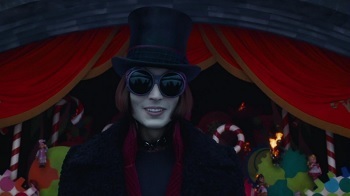
He's basically Howard Hughes crossed with a pride parade.
So why doesn't he seek medical help? If he's the world's most successful chocolate manufacturer, he must have a Scrooge McDuck amount of cash to spend. And candida is totally curable. It should be a simple case of just going to the doctor, right?
First, Wonka has no idea what's wrong with him. All he knows is that his health is waning and he is suffering from increasingly scary symptoms. Second, his aversion to anything even remotely related to his dentist father (he is still incapable of saying the word "parent") means that he can't go to see what the problem actually is. He hasn't been to a medical professional in decades (Oompa Loompa psychiatrists don't count) because he fears them. Avoidance is extremely common in abuse victims, and it's understandable that any person in the medical profession would remind him of his father and scare him shitless.
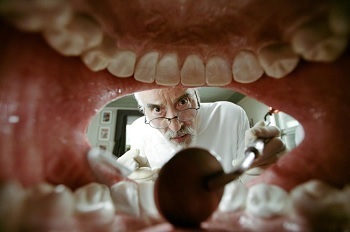
Hell, 85 percent of you reading this are scared to go to the dentist now.
Burton's Wonka is a strange and tragic creature. He is unpredictable and antisocial, afraid of criticism, quick to anger, and utterly incapable of showing remorse when children are harmed in industrial accidents (that he must have to cover the insurance for). He is a twitching, nervous wreck who dresses like Cap'n Crunch's mental uncle to hide his illness. Not surprising when you realize he is being eaten from the inside by a mushroom.
So why bother with a replacement at all? Why not just let the factory die along with him? Well, as you'll see shortly, it's not about finding a replacement candy-maker. It's about finding someone to carry on his true life's calling: justice-based serial killing. And for that reason ...
"The System" Was Carefully Rigged From The Beginning

Burton's version of Willy Wonka, in true slasher style, chooses his victims in advance, using "the system." It's all actually very Dexter-ish.
When Willy Wonka meets the five children who have golden tickets and their families for the first time, he tells Mike Teavee, "You're the little devil who cracked the system."
Mike explains "the system" during his TV interview, saying: "All you had to do was track the manufacturing dates, offset by weather, and the derivative of the Nikkei Index." Now, that makes absolutely no sense to me, but it was obviously correct, as he only had to buy one candy bar to find his golden ticket. But why does that matter? Well, if there is a system, we can therefore assume that Willy Wonka had a plan for where the chocolate bars containing the golden tickets would be distributed: It was not random. And this is alarming on an extremely important level.

"Well, time to punish your ingenuity!"
Even Willy Wonka would want someone intelligent to take over his company, so why not Mike Teavee, the one so clever he cracked the code? Because he's a little devil, that's why. Wonka is not looking for a kid who is smart and savvy and questions authority. Mike Teavee is evil in Wonka's twisted mind and must be punished along with the other kids. Wonka needs an apprentice who is innocent and impressionable, so he has to make sure that Charlie Bucket, the only guiltless child chosen by his system, gets the fifth golden ticket. But how?
Taking into account the fact that Wonka bars are sold worldwide, that far more were being manufactured for the competition than ever before, and that only five of them contained the elusive golden tickets, what are the chances that one of them would turn up in the nearest shop to the factory? And, on the very day that the Wonka bar containing the final golden ticket is going to be sold, Charlie happens to find a $10 note waiting for him in the gutter right outside the shop.
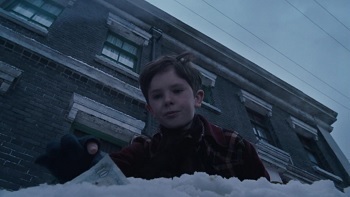
"My original plan was to drive up in an unmarked white van and offer Charlie free candy,
but apparently that's frowned upon."
When Charlie takes the money inside and asks for a Whipple-Scrumptious Fudgemallow Delight, the shopkeeper chooses which one Charlie should take, and it's not the nearest one to the shopkeeper: He has to lean over rows of similar bars to pick that one in particular. Not only that, but when Charlie discovers the golden ticket, people in the shop offer him money. Instead of selling it to the highest bidder (something he wants to do, as we learn in the next scene) the shopkeeper makes him go home. It's clear that the shopkeeper, who sells only Wonka candy in his shop, is in on it.
It's all part of "the system": Willy Wonka chose Charlie to be his heir long before he found the money or the golden ticket. And the other golden-ticket holders? Carefully chosen victims.
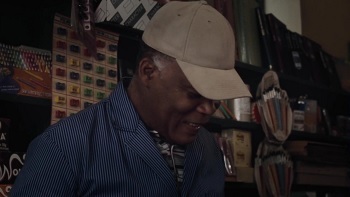
I reached out to the shop owner, but he refused to comment.
By introducing "the system," Tim Burton gives us a much more cunning and dangerous Willy Wonka. One who chooses which five children will make it to his factory and which of the five will survive unharmed. But why those particular victims? Why not just any random kid? It seems a lot simpler to just make sure Charlie gets his ticket and let fate do the rest, right? Well, not exactly. You see ...
Wonka Justifies His Murders With Strict Criteria

During the visit to the factory, all of Charlie's competitors are eliminated (and permanently mutilated) by seemingly random accidents. But, if we look again at how each child is taken out, we find that each "accident" is anything but.
Augustus Gloop was so greedy he would eat anything sweet, but he could only get his fat ass stuck in the tubes that remove chocolate from the chocolate river. The moment he falls in, Wonka is already looking for the giant pipe, which just so happens to be going straight towards him.
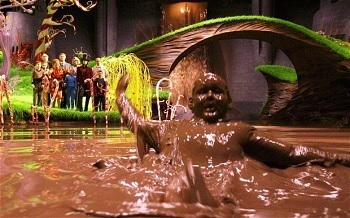
A week later, a few consumers reported that their chocolate was unusually lumpy.
Of all the myriad rooms in Wonka's physically impossible factory, Violet Beauregarde, the obsessive chewer of gum, could only have been removed by one: the room that contained his experimental, not-quite-finished, three-course chewing gum. It is Wonka who starts the machine and allows Violet to try it before ineffectually saying that it's not ready and that 20 Oompa Loompas had already suffered the same fate.
The spoiled Veruca Salt could no doubt have asked for anything in the factory and her daddy could have bought it, but Willy Wonka takes them to the room where sentient, dead-eyed squirrels sort through the nuts. Willy Wonka knows exactly what to say to push her over the edge: "She can't have one." Then he pretends he can't find the key to the gate so that her father can't rescue her in time.
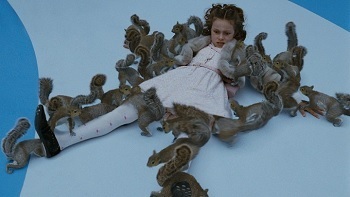
"Enjoy watching your beloved daughter get molested by wildlife!"
Mike, as his name dictates, is obsessed with television, so when Wonka gives him the choice of any room in the factory, he chooses the TV room, where the Oompa Loompas are messing around with turning chocolate digital. Wonka makes no attempt to stop Mike from diving into the teleporter and is disappointed when he manages to survive the Oompa Loompas trying to kill him there.
For Wonka, each child who suffers an "accident" is guilty of a sin. Augustus Gloop's sin is gluttony, stuffing himself with chocolate day after day. Violet Beauregarde's sin is lust: She must win everything, at any cost. Veruca Salt is easily the most spoiled of all the children: Her sin is greed. Wonka must punish the pride Mike Teavee shows in his intelligence, but, arguably, his worse crime is not liking candy.
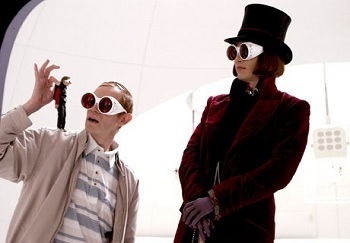
Sure, this seems like a suitable punishment.
Every time a child is eliminated, the Oompa Loompas instantly turn up and burst into eerie choreographed song and dance. In Burton's version, the Oompa Loompas are physically identical and all male. Wonka tries to explain that they come from "Loompaland," but it is obvious they are clones, created to help defend his chocolate kingdom.
But clones or not, that kind of harmony and footwork would require weeks of practice to pull off so perfectly in one take. You could easily write this observation off as just being a standard element of a musical, but the characters themselves actually address it directly. Mr. Salt notices this, saying it looks "all rather rehearsed." Mike Teavee goes even further: "Like they knew it was going to happen." They are directly telling the audience that this was all a setup. No subtlety about it.
It's basically Dante's Inferno, but with candy.
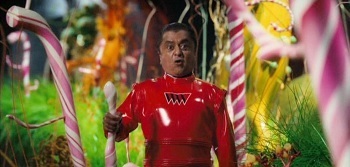
Oompa loompa doompadee door,
Now they yearn for what they fear for
Willy Wonka systematically eliminates the other kids by taking them to the rooms with the specific inventions that will entice them and thus are most likely to do them harm. Charlie, unique to the Burton film, receives no such temptation.
Burton has Willy Wonka clearly favor the eventual winner, showing no remorse or even batting an eyelid when the other children meet their cruel and unusual fates, which were designed ahead of time to fit each individual child's sin.
But the children don't die, right? How can this be a slasher flick if there is no actual death? There's a reason for that, too.
The Golden-Ticket Winners Are Not His First Victims

When the Oompa Loompas start up their first song (after Augustus' exit), Wonka says, "They haven't had a fresh audience in many a moon" (emphasis ours). If no one can get into or out of the factory, and the Oompa Loompas are clones who have certainly never left it, who was this audience?
After Veruca is thrown down the garbage chute by the squirrels, Wonka lures her father into the same trap by saying, "Sometimes they get stuck just on the inside." It's clear that, contrary to public knowledge, other spoiled children have come to the factory, where they were punished. Willy Wonka uses his factory as a giant gingerbread house to lure in guilty children and dispose of them according to their sins.
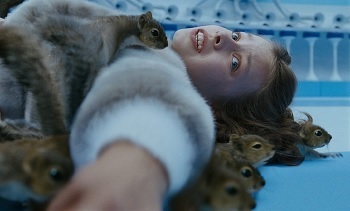
Did you know that squirrels will eat meat if no other food is available? Just sayin'.
All of the gluttons get stuck in and squeezed by the pipes that take chocolate from the chocolate river. Those guilty of lust are turned into giant gobstoppers. The greedy are burned in the furnaces along with the garbage. The children whose sin is pride are shrunk down and teleported into the TV, where they are attacked by the Oompa Loompas.
The only deadly sins that Wonka does not punish are vanity, envy, and wrath, the three sins that he himself is guilty of. He's vain about his appearance (not to mention his unmatched skill at candy-making) because he is ill and needs to cover it up; he is envious of the children's ability to get anything they want from their parents, as he never had that growing up; and he is most definitely guilty of wrath, luring the unsuspecting saps into his factory and killing them off one at a time.
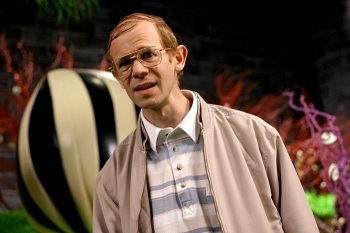
Mr. Teavee is just trying to take care of a bratty kid and an ungrateful wife on a teacher's salary,
and this is the thanks he gets?
So, considering all of this, why aren't these particular children full-on murdered? Because the whole world is watching. It's a worldwide news story, and the cameras are rolling. His real goal this time is to get them as close to death as possible in order to judge Charlie's reaction. More on that in a minute.
By letting slip that there have been previous victims, Tim Burton gives us a Willy Wonka hellbent on punishing the wicked (as he sees it) and who is guilty of far more horror than that witnessed by Charlie on the tour. The "slasher" element has been going on for years, and if it wasn't for Wonka's specific plans for this group (which caused the world to be focused on the story), all of those children would have died, just like the ones in the past.
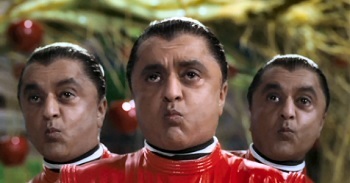
Oompa loompa doompadee doo,
Now we stab the shit out of you
Well, all of them except for Charlie. Because ...
Charlie Is Being Tested To See If He Can Deal With Murder

In Burton's movie, Wonka's system is intended to destroy the other children, leaving Charlie alone as victor. But for that to happen Charlie has to witness four acts of mutilation. Why?
Willy Wonka is a paranoid recluse, certain that everyone is trying to steal his inventions. As such, there is a terrifyingly effective security system in place.
Charlie Bucket is exposed to the factory's inner workings to see if he can handle the extreme methods necessary to protect its myriad secrets and patent-pending inventions. At every turn Wonka checks what Charlie thinks of everything he sees. He needs to know for certain that Charlie is like himself, that he loves candy (unlike Mike Teavee) above all other things, and, more importantly, that he is OK with all of the terrifying defenses put in place to protect his secrets.
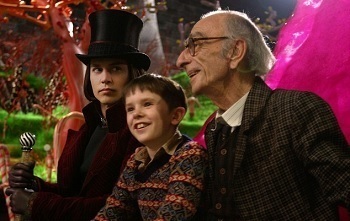
In his original plan he was going to make Charlie kill Grandpa Joe to prove his loyalty.
Most important of all, he needs someone to continue his systematic punishment of the guilty. Wonka needs to know that, after he has passed away, someone is still carrying out his twisted justice.
But why Charlie? What makes him so special? He seems too innocent to be a killer, right?
Well, in Wonka's mind, there are a lot of similarities between them both, which would translate to, "This kid has all the building blocks in place to make him just like me." They're from the same town. They were both denied candy as children (Wonka because his dad was a maniacal dentist, Charlie because his family was dirt poor). Their fathers both work in the oral-hygiene business (Wonka's dad is "the most famous dentist in the world," whereas Charlie's dad works in a toothpaste factory).
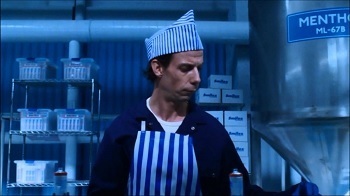
Which, like Wonka's factory, requires a whimsical costume for no good reason.
But, as with all good slasher flicks, the killer is eventually destroyed. Most of those movies end with a machete to the killer's head; this killer is defeated with psychology. After Charlie has won, he refuses to leave his family behind and live alone in the factory as the new face of chocolate-powered infanticide. And the "living alone" part is extremely important to Wonka, because how could Charlie commit murder if his family is around? How could he experience the suffering and loneliness (necessary for murderous motivation) if he doesn't adhere to Wonka's own lifestyle?
Instead, Charlie accompanies Wonka to visit his father and they make amends, which unravels everything and defeats the demon. That visit and reconciliation stops Wonka's emotional need to punish spoiled children. It also destroys his fear of doctors, allowing him to finally confront and cure his physical disease. At the end we see that Willy and Charlie are working together, because there is no longer a need for him to retire.

"First, we need to take you to ... is there such a thing as an anti-tanning bed?"
In the other versions of the story, Willy Wonka is simply an eccentric chocolatier who has way too much time on his hands. Tim Burton, however, paints him as the villain of a slasher flick, showing how and why he came to be what he is, how he ensnares and disposes of his victims, and why he wants them to be punished. As I said: unhinged.
For more children's pop culture that is anything but, check out The Filthiest Joke Ever Hidden in a Children's Movie and 7 Horrifying Moments from Classic Kids Movies.
Be sure to follow us on Facebook and YouTube, where you can catch all our video content like After Hours, Cracked Responds, New Guy Weekly, and other videos you won't see on the site!






